- This article is about the modern republic; for other uses, see Palestine (disambiguation).
Palestine (Arabic: فلسطين falasṭīn), officially the Republic of Palestine (جمهورية فلسطين jumhūriyat falasṭīn), is a country in the Middle East, straddling North Africa and Western Asia as well as the Mediterranean and Red Sea. Its territory consists of the West Bank, Gaza Strip and East Jerusalem, its seat of government, and Port Said, its main seaport and most populous city. The 1949 Armistice Agreement lines (the Green Line) separate Palestine proper from the territory of Israel (including West Jerusalem). Palestine also borders Egypt to the west along the Suez Canal, Jordan to the east across the Jordan River and Dead Sea, and Saudi Arabia to the southeast across the Gulf of Aqaba. Lebanon and Syria are located to the north and northeast, respectively, separated from the West Bank by Israeli territory. The country is geographically diverse: packed into Palestine's small area are snow-covered mountains, parched deserts, fertile fields, lush woodlands, and complex systems of wadis that feed into streams and rivers. No less than four different geographical zones are included in the territory of the country, and its climate ranges from arid to temperate to subtropical.
The First Palestinian Republic was proclaimed in the former British Mandate for Palestine shortly before the 1948 Arab–Israeli War, which erupted between the recently declared State of Israel and the Palestinian republic supported by a coalition of five Arab states, and ended in early 1949 with an armistice that established the Green Line along the front separating Israeli- and Arab-controlled areas. Following the war, the Arab side of the Green Line became the de facto Palestinian republic; however, the Palestinian government de jure maintained its claim over the entire territory of the former mandate, a claim which persists to this day and is counted as one of the central issues of the ongoing Israeli-Palestinian Conflict. The two decades of 1948–67 saw the Palestinian state develop its political life under the auspices of the Arab League, to which it was admitted in 1950, interspersed with a handful of regional confrontations, notably the Suez Crisis of 1956, which resulted in the transfer of the Sinai from Egyptian to Palestinian control and a joint Egyptian-Palestinian nationalisation agreement of the Suez Canal. During this time, the republic developed close ties with the Soviet Union as a bulwark against Western backing of Israel, reflected by a comprehensive economic and strategic relationship with Russia which lasts to this day.
Following the 1967 Six-Day War, which ended in Arab defeat, Palestine was occupied by the Israel Defence Forces (IDF) and its government exiled to Cairo. Under the occupation, Arabs were stripped of basic rights, and more and more Jewish settlements began to appear, often built atop demolished homes on stolen Palestinian land; the resulting indignation and popular anger soon led to the development of an insurgency. This culminated in the 1976–79 Sinai War, during which the Palestinian National Salvation Front (PNSF), led by Rifaf Khan and Yasser Arafat, confronted the occupation, eventually driving the IDF back into Israel proper and re-establishing the Palestinian republic. After the end of occupation, Khan and Arafat served as the fifth and sixth presidents of Palestine, respectively, both serving up to their deaths. The postwar Ba'athist administration established many social programs during the 1980s under Khan, including universal healthcare and a social security system. The late 1980s saw an exponential increase in the standard of living after the end of the reconstruction period; following increased military spending under Arafat in the early 1990s, confrontation with Israel re-erupted in two brief episodes in 1994 and 1996, respectively, which ended with the return of East Jerusalem to Palestinian control for the first time since 1967, and the establishment of a demilitarised zone encompassing the Old City of Jerusalem monitored by UN peacekeeping forces.
Today, Palestine is a rapidly developing, relatively stable country, whose relationship with Israel has more or less normalised despite persisting issues. The country was left mostly unscathed from the widespread political upheaval and violence known as the Arab Spring which swept the region beginning in 2011. Palestine is an ethnically and religiously diverse state: Arabs make up approximately 95% of the population, divided more or less equally between Sunnis and Shias but including Christians as well, while the remaining demographic consists of many other communities with historical ties to the area, like the Druze, Jews, Samaritans, Copts and Turks. The Palestinian government is officially secular, and all citizens are equal before the law according to the constitution. Palestine's official language is Arabic, spoken at home by most ethnic groups other than Jews and Turks. It is considered an upper-middle income economy: industry is well-developed, especially the manufacturing and construction sectors, the formerly service-based commercial sector is increasingly diversified, and the country boasts a relatively high level of human development—indeed, Palestine has the highest standard of living and nominal per capita GDP in the Arab world outside the oil-rich economies of the Persian Gulf. It is a middle power, and has been considered a nuclear weapons state since 1988, although this is not acknowledged by the government and as such Palestine is not signatory to the Treaty on the Non-Proliferation of Nuclear Weapons. Palestine's premier regional ally is the Syrian Arab Republic, and the country also maintains close diplomatic and economic relationships with Russia, Iran, the People's Republic of China, the Celtic Confederation and Venezuela. Palestine is a full member of the United Nations, the World Trade Organization, the World Federation of Trade Unions, the Arab League, and the Non-Aligned Movement.
Etymology[]
The name Palestine is derived from the Latin name Syria-Palaestina, which was given to the province of Judaea after a failed Jewish revolt against Roman rule was punished by the expulsion of the Jews from the region and its reorganisation and renaming in order to erase any trace of Jewish connection to the homeland. The name eventually came to be used by the mostly Arab (but including many other minority ethnic groups) population of the region between the Jordan River and Sinai Peninsula during the Ottoman Empire's centuries-long rule of the Greater Levant, during which time Palestine including Jerusalem was administered as a province of Damascus. Following the fall of the Ottoman Empire after the First World War, the British established a colonial regime in the area under the auspices of the League of Nations officially known as "Mandatory Palestine". With the rise of nationalism in the mandate following the end of Ottoman rule, the name came to embody the Arab community's desire for independence, referring to a “Republic of Palestine” in Arab nationalist literature as early as 1919.
History[]
Main article: History of Palestine
Geography[]
Regions[]
Palestine is composed of two geographically separate regions: the Sinai Peninsula and Gaza Strip (usually including the island city of Port Said despite its separation from the Sinai mainland by the Suez Canal), which form a single contiguous region exclaved from the West Bank, which surrounds East Jerusalem, Palestine's seat of government and half of its proclaimed capital. This separation is due to the Green Line, the boundary that was established along the frontline between Israeli and Palestinian forces per the terms of the 1949 Armistice Agreement, which ended the Arab-Israeli War. The Palestinian government continued to claim the Israeli-controlled territory, but over a half century later, Israel remains along these borders and the Palestinian state has had to cope with being physically divided from itself.
The Gaza Strip (which is sometimes called the Gaza Panhandle as it extends from the northeastern corner of the Sinai), at its northernmost point, is separated from the West Bank by roughly 10 km of Israeli territory, the narrowest portion of territory separating Palestine's two contiguous regions, known as the Ruhama Divide, named after the kibbutz of Ruhama located in the divide at the edge of the Negev; an extension of Palestinian Route E-1 runs through Ruhama along Israeli Route 334, connecting the city of Najd at the end of Gaza to the border station entering the West Bank near Zahiriya. Since the normalisation of relations between the two nations post-2000, especially after the death of Yasser Arafat in 2004, border control along this corridor has been relatively relaxed, with most private Palestinian citizens without a criminal record able to traverse this territory with relative ease, however rarely visa-free (usually only for transportation companies with a special pass). There is also a double-track railway running through the Ruhama Divide owned by Palrail, which operates freight trains along the route as well as an intercity passenger line connecting Gaza City and East Jerusalem.
Environment[]
The terrain of the Sinai Peninsula is mostly arid desert, flat or rolling, with dunes near the coast; the southern third of the Sinai Desert is very mountainous, with jagged cliffs and steep canyons, only levelling out as one approaches the coast. The terrain of the West Bank is mostly rugged dissected upland, with freshwater and vegetation in the west, but somewhat barren in the east closer to the Dead Sea. The elevation span reaches from a low on the northern shore of the Dead Sea at 429 m below sea level, to the highest point at Mount Nabi Yunis at 1,030 m (3,379 ft) above sea level. The area of the West Bank is landlocked, as it is geographically separated from the rest of the country by Israeli territory; its highlands are the main recharge area for Israel's coastal aquifers.
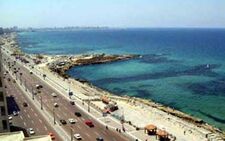
El-Hadra Blvd on the Mediterranean coast in Gaza City
The Mediterranean coastal plain of Gaza and the Sinai is composed of sand dunes and fertile sandy sediments. Except for a porous calcareous sandstone called kurkar in Arabic, there are no other rocks in this region. In contrast, the West Bank is dominated by low mountains: Mount Nabi Samwil (890m), Mount Gerizim (881m) and Mount Scopus (826m). The rocks are principally composed of marine sediments (limestone and dolomite). The porosity of these rocks permits water to filter down to the non-porous strata, which supply water to the numerous aquifers in the region.
The Jordan Valley is a segment of the Dead Sea Transform, a continuation of the Great Rift Valley which separates the African Plate from the Arabian Plate. The entire segment is thought to have ruptured repeatedly, for instance during the earthquake of 749 and again in 1033, the most recent major earthquake along this structure. The deficit in slip that has built up since the 1033 event is sufficient to cause an earthquake of Mw~7.4. The tectonic disposition of Palestine on the margin of the Dead Sea Transform has left it exposed to relatively frequent earthquakes, the most destructive of which were those of 31 BCE, 363, 749, and 1033.
The River Jordan is the largest river in Palestine, forming the eastern boundary of the West Bank, until it flows into the Dead Sea. The Dead Sea is the largest body of water in Palestine, while the valley of Marj Sanur forms a seasonal lake.
A number of ephemeral streams, in Arabic called wadis, flow into the Jordan River or Dead Sea through the West Bank, including Wadi Og, Wadi Fa'rah and Wadi Qelt. Others flow through Israel and into the Mediterranean Sea, such as Hadera Stream and Wadi Kabiba. The central and northern inland areas of the Sinai Peninsula are composed of a vast network of wadis, which are usually dry but which flood periodically during the wet season, flowing into floodplains in the northern Sinai desert; there is enough water gathered in this area year round that the River Pleides begins, which flows north-northwest 50 km before emptying into the Mediterranean at Arish.
Climate[]
The climate in the West Bank is mostly Mediterranean, slightly cooler at elevated areas compared with the shoreline areas. In the east, the West Bank includes much of the Judean Desert including the western shoreline of the Dead Sea, characterised by dry and hot climate.
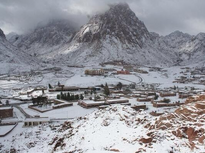
A snow-covered St. Catherine's City near Mount Sinai in December 2010
Gaza and the northern Sinai have a hot semi-arid climate (Köppen: BSh) with mild winters and dry hot summers. Spring arrives around March–April and the hottest months are July and August, with the average high being 33 °C (91 °F). The coldest month is January with temperatures usually at 7 °C (45 °F). Rain is scarce and generally falls between November and March, with annual precipitation rates approximately at 4.57 inches (116 mm).
The highlands of the West Bank have been known to see occasional light snowfall in December, as far south as Jerusalem and Bethlehem, and less often the southern highlands of the Sinai Peninsula. The northern Sinai and Mediterranean coast from Gaza City to Port Said typically sees heavy rain around this time, with much higher humidity. The southern Sinai is much more arid, and sees far less rain, with its minimal precipitation channeled via networks of streams to join the wadis to the north which empty eventually into the Mediterranean. Along the wadis exists much more fertile land, which in places has been converted into farmland, a major contrast to the barren desert on all sides.
This environmental diversity makes Palestine home to a stunning variety of plants and animals. Some 47,000 living species have been identified in Palestine, with another 4,000 assumed to exist. There are 116 species of mammals native to Palestine, 511 kinds of birds, 97 types of reptiles and nine types of amphibians. Some 2,780 types of plants grow countrywide, from Alpine flowers on northern mountain slopes to bright red coral peonies and desert papyrus reeds in the south.
Flora[]
"A land of wheat and barley and vines and fig-trees and pomegranates, a land of olive oil and honey."
- —Deuteronomy 8:8
Much has since been added to this Biblical description of what grows in Palestine. Bananas, oranges and other citrus fruits dominate the coastal plain. Deciduous fruit trees grow all over the country, but particularly well in the cool hills. Dates, bananas, avocado, guava and mango flourish in the hot Jordan valley, particularly in the fertile fields between Jericho and Sophron. The basic grains rub shoulders with vegetables and tobacco, cotton, groundnuts and sugar beets.
Palestine's landscape of flowers and plants changes abruptly with its different geographical regions. Natural woodlands of Palestine oaks (Quercus calliprinos) cover the upper Galilee, Mount Carmel and other hilly regions. In spring, rockrose (Helianthemum nummularium) and thorny broom (Calycotome infesta) turn the hillsides pink, white and yellow. There are hyacinth, crocus and narcissus in the mountains as early as December, followed by anemones, tulips, cyclamen, iris and daisies. Honeysuckle creeps over the bushes, and large plane trees provide shade along the freshwater streams of the West Bank's northern highlands that feed into the Galilee. The Sinai Peninsula's southeastern Red Sea coast, at the entrance to the Gulf of Aqaba, features a vast expanse of coral reef, hosting a complex aquatic ecosystem home to many rare species.
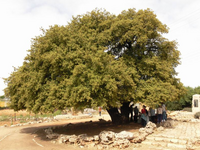
A Palestine Oak (Quercus calliprinos) outside Bethlehem
The country's woodlands and forests were ravaged during centuries of warfare and neglect, but much has been done to reforest the countryside. Today, there are over 200 million trees in Palestine—forests of pine, tamarisk, carob and eucalyptus. Wildflowers and medicinal plants grow in profusion. Fruit trees bloom from January to April. In the south, acacia trees and the prickly Indian fig cactus (Opuntia ficus-indica) suck moisture from the desert. In the Sinai highlands, massive Atlantic pistachios (Pistacia atlantica) strike a dramatic note among the dry riverbeds, and date palms (Phoenix dactylifera) grow wherever there is sufficient underground water.
Many of the country's cultivated flowers—among them, the iris, madonna lily (Lilium candidum), tulip and hyacinth—have relatives among wild flowers. Soon after the first winter rain in the fertile crescent, a green carpet grows, covering the country until the next dry season. Pink and white cyclamen and red, white and purple anemones bloom from December to March, followed by the blue lupin (Lupinus angustifolius) and yellow corn marigold (Chrysanthemum segetum). Many native plants, such as the crocus and squill, are geophytes, storing nourishment in their bulbs and tubers and blooming at the end of the summer.
Picking wildflowers used to be a popular pastime, with some even sold commercially. In the mid-1960s, however, the Nature Reserves Authorities in Palestine and Israel, with the help of the Palestine Wildlife Society and the Society for the Protection of Nature in Israel, published a list of protected wildflowers and launched a vigorous education campaign. The public was urged: "Don't pick! Don't uproot! Don't buy! And don't sell!" The effort saved Palestine's wildflowers, and four decades later it is considered one of the most successful nature protection campaigns to be conducted in the region.
Politics[]
According to the 1979 constitution, Palestine is a secular republic, whose politics take place within the framework of a semi-presidential system. The President of Palestine is vested with strong executive authority, including the power to declare war or martial law, grant amnesty, pass decrees which carry the full force of law, and veto new legislation; the President may delegate any such powers to the Vice President, whom he appoints. The President is elected in a direct election to a six-year term; there is no limit to the number of consecutive terms a president may serve.
Palestine has a tradition of grassroots politics, dating from before independence, which has been the foundation of many of the most prominent contemporary political parties. There is also a tradition of religious parties: the Muslim Brotherhood has traditionally represented the mainstream Sunni Islamist movement, and the Phalange Party is a united coalition of Arab Christian parties allied with the namesake Lebanese party; both have been outlawed since 1984, after a series of violent confrontations with the secular government resulted in an executive decree banning “reactionary religious extremist” parties. The Phalangists are now mostly defunct; the Muslim Brotherhood, however, retains significant support amongst the more conservative elements of the large Sunni community, and has evolved into the central dissident trend in the republic, the main illegal opposition. The Palestinian state security agencies regularly infiltrate the activities of the Brotherhood and other Islamist groups, but they continue to have an active, often disproportionate influence within opposition politics.
Government[]
The Prime Minister leads the Council of Ministers, the highest executive and administrative government body in Palestine. Ministers are responsible for hiring and overseeing the staff of their respective ministry, each of which executes the authority of the executive branch of government in its respective domain. For example, the Minister of Foreign Affairs acts as head of the nation's international diplomatic profile, and supervises the Palestinian ambassador to the UN and the ambassadors who head Palestine's many foreign missions. The Council of Ministers also consists of the chairmen of executive state committees, which are similar to ministries but acting on an inter-agency level. Most ministry headquarters and other government buildings are located in the central boroughs of East Jerusalem like the American Colony or Mount Scopus; however, the Ministry of Defence headquarters, known as the Mukataa, is located 10 kilometres to the north of the capital in Ramallah.
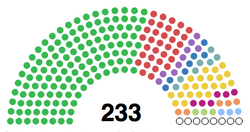
Palestine Arab Congress 2017 election results:
NATIONAL PROGRESSIVE FRONT:
• Ba'ath Party (131 seats, government)
• Communist Party (33 seats)
• Democratic Front (9 seats)
• Revolutionary Alliance (7 seats)
• People's Party (7 seats)
DEMOCRATIC ALLIANCE:
• Nationalist Party (21 seats)
• National Initiative (6 seats)
• Third Way (5 seats)
• Palestine Arab Party (3 seats)
• Democratic List (3 seats)
independents (8 seats)
The legislative branch of government is the Palestine Arab Congress, a unicameral assembly of 233 seats. Each census electoral district of approximately 40,000 people elects a single deputy to its respective seat, using the first-past-the-post system. The Palestine Arab Congress elects the Prime Minister, who can be removed from office and his government dissolved via a vote of no confidence. It may also initiate impeachment proceedings against the President, which must be approved by a minimum of 75% of deputies before going to the Supreme Court for final ruling.
The ruling political party, the Palestinian Regional Branch of the Arab Socialist Ba'ath Party, leads the National Progressive Front, a coalition of four other allied leftist parties (including the Communist Party) which officially support the ruling party and are subordinate to its decisions. The mainstream political opposition is represented by the Democratic Alliance, a coalition of the five opposition parties in Congress, led by the Nationalist Party. There are also eight seats held by independents who are not part of either coalition.
Administrative divisions[]
The municipalities of Palestine each have their own local municipal government, which is delegated executive authority within its jurisdiction by the national government in accordance with statute. A municipal government handles most routine local administrative affairs, from property taxes and licensing local businesses to coordinating utilities and essential services with the national government. Municipal governments can be one of two types: mayor-council governments, the more common form, are headed by an elected mayor who appoints his cabinet; the council-manager form consists of an elected council responsible for policymaking, which elects a manager to execute municipal policy and handle routine affairs, much like a CEO elected by the board of a publicly traded corporation.
Palestine consists of 44 counties. Counties function solely as administrative divisions, as they do not have a proper government: the mayor or manager of each constituent municipality together sit on the County Council, which exists to liaison between municipal governments and the national government as well as with other counties. East Jerusalem and Port Said are special administrative municipalities which are not part of any county; both consist of multiple boroughs with devolved authority from the special administrative municipality.
Law and order[]
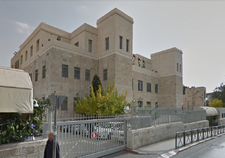
Supreme Court of Palestine, American Colony, East Jerusalem
The highest judicial authority is the Supreme Court of Palestine, located in the capital city; it has the ability to overturn all previous rulings and set legal precedent, and appoints the Constitutional Council to draft amendments and uphold the constitution's integrity, as well as the Court of Appeals which is subordinate only to the Supreme Court. According to the constitution, the judiciary is independent of the other branches of government. Supreme Court justices are appointed by the President on advice of Congress. The Chief Justice of Palestine is appointed by the President and leads the Supreme Court, presiding over eight puisne judges, the senior of which leads the Supreme Court in the absence of the Chief Justice. Municipal courts function as courts of first instance for civil cases litigating under PSD 100,000, as well as criminal cases where the maximum possible sentence is five years; they are also responsible for administration of private, public and corporate property registration and taxation. Municipal courts are subordinate to county courts, which handle all cases beyond the municipal courts' mandate except those cases of national jurisdiction in the Supreme Court or Court of Appeals.
Palestine uses a common law legal system, in which previous rulings affect the court's interpretation in subsequent cases, inherited from the period of the British Mandate. Proceedings use the adversarial system, in which the prosecution and defence have separate representation, with the court acting as an impartial referee. Routine civil and minor criminal cases are usually ruled upon by the presiding judge, with serious criminal and felony cases typically involving a jury. The legislative branch of government, namely the Palestine Arab Congress, debates upon and passes the laws, which are interpreted by the judiciary and enforced by the executive. The system of family law is confessional, meaning that issues such as marriage, divorce, child custody and debts within a single religious community may be resolved by that community's religious code. For example, the Shiite and Sunni communities have their own Sharia courts and Shura (representative) councils, similar to the Jewish and Christian family courts which use Halakha and canon law, respectively. There is also a detailed secular family code, which applies in cases of difference of religious faith amongst litigants or for agnostic/secular families. The Minister of Justice, also known as the Attorney-General of Palestine, commissions and oversees the attorneys responsible for public prosecution, in which they act as representative of the republic and the enforcement of its laws. Defence attorneys are mostly private practice, but the government runs a comprehensive legal aid program which subsidises legal fees for citizens unable to afford private representation.
Law enforcement in Palestine is centralised at the national level. Regular police work is the responsibility of the Gendarmerie, which is actually part of the armed forces and thus subordinate to the Minister of Defence, but granted legal jurisdiction in civilian law enforcement in addition to its provost (military policing) function. The National Police Corps of the Gendarmerie handles all civilian law enforcement duties, and is under the jurisdiction of the Minister of Interior during peacetime. It is divided into departments at the county and municipal level, which handle public safety, traffic control and other routine policing matters; there is also a department each for East Jerusalem and Port Said, and a department with national jurisdiction. The national prison and correctional system is handled by the Corrections Directorate under the Ministry of Interior.
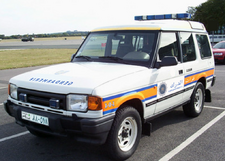
Standard patrol vehicle of Gendarmerie
Police, fire or medical emergency services can be reached by telephone from any location within Palestine by dialing 101; operators dispatch gendarmes from the National Police Corps to civilian policing calls, and municipalities contract with the Palestinian Red Crescent Society for ambulance services and the Palestinian National Fire Rescue Society for firefighting and emergency first response, both independent of but entirely subsidised by the national government; every municipality in Palestine has at least one firehall and ambulance station.
Despite moderate levels of poverty in many communities, resulting in a pattern of youth unemployment which is periodically exacerbated by economic crisis (especially after 2008), Palestine has a very low crime rate, and is considered one of the safest countries in the Middle East. In fact, incidents of regional conflict or terrorism, while not very common either, account for more injury and death in an average year than violent crime. This is partly a result of the government's socialist policies, which involve universal healthcare and a social security system, which includes unemployment insurance and assistance for the physically or mentally disabled. Similarly, the government's approach to the problem of drug addiction, which is especially prominent in Port Said and Gaza City, involves a zero-tolerance policy concerning drug traffickers and associated criminal elements, alongside a policy of harm-reduction toward addicts and the mentally ill (whether associated with crime or not), with the healthcare system operating several rehabilitation centres and psychiatric hospitals as well as out-patient treatment programs. Port Said is the only city to have set up a needle exchange and to have legalized methadone maintenance clinics; in the rest of the country, addiction treatment is primarily abstinence-based, and an insulin prescription is required to purchase hypodermic needles.
Foreign relations[]
Traditionally, foreign policy decisions have been ultimately realised by the president. Nevertheless, there was always a certain level of adherence to official policy, making efficient work of the foreign ministry in diplomatic relations due to ideological consistency, especially since the beginning of Ba'athist rule in 1979. From the beginning, the Palestinian state was closely allied to the Soviet Union, a bulwark against American support of Israel, an alignment today reflected in the close Russian–Palestinian relationship. Palestinian sovereignty would remain the ideological foundation of the republic. Nevertheless, the Ba'athist government, with their pan-Arab nationalist conviction, took it a step further toward active promotion of foreign party branches, organising brigades of activists for missions to other Arab countries, funded mostly by Syria.
The Palestinian government had ambivalent relations with Iran until after that country's 1979 revolution, after which a closer and somewhat strategic relationship developed. In the last few decades, Iran has typically taken a much firmer stance toward Israel than other regional powers, further strengthening relations with the Palestinians. Palestine backed Iran during the Iran-Iraq War, denouncing Saddam Hussein's predatory behaviour; it is worth noting the Palestinian Ba'athists had sided with Syria since the Syrian–Iraqi schism within the party in 1966, before the Palestinian Regional Branch was in power. However, it is also worth noting that the Palestinian government was against the 2003 Invasion of Iraq by the American-led coalition; nevertheless, Palestinian-Iraqi diplomatic relations have greatly improved since the fall of Saddam's regime, owing at least partially to the post-invasion Iraqi government's close relations with Syria and Iran. Since the beginning of the Syrian crisis in 2011, Palestine has firmly backed the Syrian government, deploying several special forces brigades in 2014, joined by regular forces after the beginning of Russian intervention in support of Syria in 2015. The Palestinian government cooperates with the Russia-Iran-Iraq-Syria intelligence-sharing alliance.
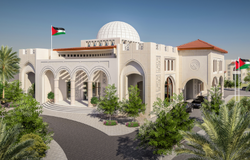
Palestine developed a good working relationship with the People's Republic of China during the 1990s under President Arafat. After the dissolution of the Soviet Union, Russia was caught up with its internal transition, and Palestine, short of reliable allies as tensions mounted with Israel, inched closer to Beijing's growing sphere of influence. In recent years, Chinese–Palestinian relations have solidified, with several economic agreements in place as well as a tradition of mutual moral support. Palestine recognises the communist government in Beijing as the legitimate government of China, maintaining no formal relations with the Republic of China and the Kuomintang administration in Taipei.
Since its founding, the Palestinian republic has maintained an unpredictable, often hostile relationship with Israel. The two nations have fought at least nine full-scale wars in six decades, punctuated by multiple political crises and military clashes. The Palestinian government continues to consider all Israeli-controlled territory (except the occupied Syrian Golan Heights) to be sovereign Palestinian territory; the Green Line was thus never more than a ceasefire line established by an armistice agreement. Since the election of President Kindi and subsequent maturing of relations with China, which trades with Israel, it is interesting to note, the Palestinian government has mostly phased out the popular promotion of hostile or irredentist rhetoric against Israel in favour of calm negotiation to resolve disagreements and encourage normalisation.
Israeli Mossad (lit. "the institution [of intelligence]") and Palestinian Mukhabarat (military intelligence) agents have a long tradition of operations and counter-operations in political intrigue and economic subterfuge operations and counter-operations against one another, with the relationship between these agencies recurring as a decisive factor in multiple conflicts' outcomes. It is believed by some analysts that the Israelis blame operatives of the Air Force Intelligence Directorate for stealing top secret nuclear knowledge in 1985; notwithstanding, Israel considers the Palestinian Armed Forces to be nuclear capable, even if this remains to be confirmed by the Palestinian government. If true, Palestine would be the first Arab country to have successfully developed nuclear weapons.
Since the start of the Jordanian Crisis resulting from the 2011 Arab Spring, Palestine has maintained a military occupation of Jordan, supporting the rule of King Abdullah and constitutional monarchist and republican forces in an alliance of convenience against Islamist groups, deploying forces to the country to fight al-Qaeda and allied groups alongside the Jordanian Army thereby enforcing the rule of the coalition provisional government, thereby securing the political transition. In line with a pattern displayed over the past decade, in 2014 the US government and its regional allies such as Saudi Arabia, Qatar and Turkey were confirmed by Palestinian intelligence to be directly funding the Islamist terrorist groups in Jordan as well as Syria and providing them with weapons. This occurred against a backdrop of a swift takeover of much of Iraq and Syria by the Islamic State, with which many of the Jordanian militant groups were allied, with Palestinian Representative to the UN Rami Hamdallah accusing the Americans of "fighting the Islamic State in Iraq [while] supporting their cousins in Jordan and Syria." This resulted in a deterioration of Palestinian–American relations and the further polarization of regional powers, with the Palestinian government going on to firmly express its support for the Syrian government and other powers, such as Russia and Iran, at odds with US interests in the region. The Palestinian occupation of Jordan also directly strengthened the Palestinian government's longtime close relationship with the Syrian government. As of 2018, the Palestinian Army remains stationed throughout Jordan, but the situation has more or less stabilised.
Military[]
The Palestinian Armed Forces are subordinate to the Ministry of Defence, led by the Minister of Defence who is responsible for formulating national defence policy and is a member of the Council of Ministers of Palestine. The armed forces consist of four main service branches: the Army, Navy, Air Force and the Gendarmerie, the latter of which functions as the nation's public law enforcement agency and military police. The Army, Navy and Air Force each have a complementary reserve force; the Gendarmerie does not have a reserve force, as only the provost (military police) divisions deploy in wartime, with municipal policing regiments remaining on the home front to maintain law and order. National defence policy mandates the reserves be at least as numerous in personnel as the active forces during peacetime. With approximately 300,000 active servicemen and 330,000 reserve servicemen as of December 2018, the Palestinian Armed Forces numbers over 600,000 personnel; this is not counting the approximately 159,000 militiamen of the National Guard, the national militia and popular mobilisation corps which falls outside the jurisdiction of the Minister of Defence.
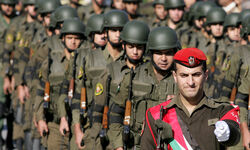
151st Security Regiment of the Republican Guard and a political officer in 2010
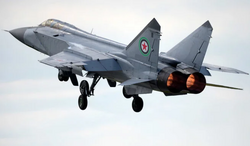
A MiG-31 of the Palestinian Air Force taking off from Atarot Airbase in 2011
The military has traditionally played an important role in politics; coups have been attempted and twice succeeded; during the post-1967 Israeli occupation of Palestine, it was partisan remnants of the Palestinian military loyal to Ba'athist officers which led the uprising and eventual war that successfully shook off the occupation and reestablished the sovereign Palestinian republic, sidelining the exiled former leadership. Since the start of Ba'athist rule in 1979, the armed forces and militias have been central to a comprehensive coup-proofing policy. The National Guard’s dual purpose is to protect local communities in wartime to free up regular military forces for frontline combat, and to prevent the possibility of a coup by having a parallel hierarchy loyal to the Palestinian Regional Branch of the Ba'ath Party not under the command of the armed forces or the Minister of Defence. This second political role is shared by the Republican Guard, an elite mechanized army division responsible for protecting the President, Prime Minister and Cabinet of Palestine, and the only division of the armed forces allowed on the grounds of the Presidential Palace; its loyalty has been a decisive factor in determining the stability of a given administration.
Palestine has a relatively developed defence industry, which manages to supply much of the basic equipment to the armed forces including small arms, with ammunition being almost exclusively domestically produced; major national defence contractors include Motefajrat el-Horriyeh, which produces the F-5 service rifle and T-1 main battle tank, and the Jaffa Shipyard subsidiary Jamaat Buhar, which manufactures ships and naval armaments for the Palestinian Navy and exports naval products to Syria and Iran. Military service age is 18 to 49. All males must serve twenty-two months in the armed forces upon reaching 19; this service obligation may be delayed for post-secondary studies, but must be made up for upon graduation, usually via the commissioned officer corps. The three main branches each have a reserve component, which are set up to supply troops in wartime as required; in peacetime, they run the state's cadet programs for school-aged children and adolescents, teaching survival and defence skills and providing an important service to local communities via teamwork and leadership training and the building of confidence and patriotism.
Economy[]
The economy of Palestine is relatively diversified. The public sector is large and includes multiple state-owned corporations whose profits are reinvested into domestic infrastructure and social services. However in many ways the economy has stagnated due to an over-reliance on state industry in a market economy. Nevertheless, in addition to a reasonably developed service industry, the modern Palestinian economy features a growing medium and heavy industry sector, boosted by government subsidy and endeavours such as the Palestinian National Railway Company (Palrail), a state-owned enterprise founded in 1955 which owns all rail infrastructure in the country, and today runs six intercity passenger lines as well as significant freight rail transport operations across the region. The Suez Canal Authority is owned jointly by the Palestinian and Egyptian governments, and is responsible for maintaining and operating the Suez Canal, which is a major staple of the Palestinian economy and one of the largest employers in the country, employing up to 10% of the national workforce. The shipbuilding industry is also a rapidly expanding sector, with several manufacturers based on the canal around Port Said such as Jaffa Shipyard, as well as the shipping conglomerate Sinocrot, which operates one of world's largest container ship fleets. There is also a relatively well-developed oil industry: the Palestine National Oil & Gas Co. has major drilling operations in the north Sinai, and Sinocrot operates several platforms in the fields off the Mediterranean coast discovered in the late 1990s. Other resource-based industry includes mining in the south Sinai, as well as a newer artisan cosmetics industry based around a handful of companies crafting products from the rich minerals found in multiple deposits adjacent to the Dead Sea. In the last two decades, the nation has developed a relatively prosperous domestic defence industry in supplying the Palestinian military with much of its equipment, limiting military imports to tanks, aircraft and advanced weapons. The contemporary boom in domestic defence contractors such as Motefajrat el-Horriyeh has indirectly contributed to growth among investment in high-tech startups, an industry previously rare in the country.
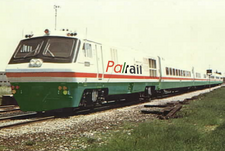
Palrail Express intercity passenger train on the Port Said–Gaza City route
Tourism is another important sector of the Palestinian economy. Millions of international visitors are drawn from all corners of the globe to the country each year due to its central importance to all three Abrahamic faiths. Multitudes of local companies have developed around the industry, providing authentic dining and hospitality services as well as all sorts of related businesses like souvenir shops and companies offering guided tours. Some of the most popular sites for tourism include Mount Sinai and St. Catherine's Monastery, the Dead Sea and Jericho, and the Old City of Jerusalem, which is part of the demilitarised zone monitored by UN peacekeepers separating East and West Jerusalem and accessible only to pedestrians. The city of Sharm el-Sheikh, which overlooks a great coral reef on the Gulf of Aqaba, is home to multiple luxury beach resorts and frequently hosts national and international conventions and diplomatic conferences, notably the Arab League summits. The Ministry of Tourism was established during the presidency of Rifaf Khan in order to better facilitate international tourism by coordinating relevant businesses and services and subsidising promotional offers to attract further investment in the industry.
In addition to the nationalisation and total state subsidisation of transportation, utilities and vital infrastructure, the policies of the government have led to the existence of multiple large employee cooperatives and public joint-stock companies. All medium to large companies are required to have their employees form labour unions, and catch-all unions exist for employees of small private businesses. The government has also maintained a strict minimum wage law since the late 1980s, as well as a social security system which includes unemployment insurance and work-related injury compensation. The Ministry of Labour was established in 1980 to maintain high standards of workplace safety throughout the nation, holding employers to account for the well-being of their employees. The secretariat also attempted to combat corruption and sabotage which had become unfortunately common since the start of the nationalisation campaigns. Together with Internal Affairs, the Secretariat of Labour also began a campaign following the late 1990s market reforms targeting corruption in both state and private industry. The severe penalties for professional corruption the campaign entailed, which included lengthy prison sentences for bribery as well as the death penalty for top officials involved in industrial sabotage, led to a significant reduction in corruption across the state and economy; today, Palestine has one of the lowest levels of perceived corruption in the Arab World.
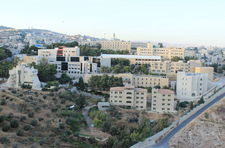
Palestine Polytechnic University main campus in Abu Dis
The state-funded education system, which includes subsidies for post-secondary institutions, has created a completely literate population. One in four Palestinians over the age of 30 has at least a bachelors degree. The multiple social programs and economic incentives championed by the government have created a general standard of living higher than most other Arab countries outside the Gulf; nevertheless, unemployment among educated professionals remains a problem in many industries, and since the recession, youth unemployment has risen and social safety nets and related services are over capacity.
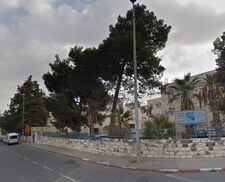
St. Joseph's Hospital in the American Colony borough of East Jerusalem
The public healthcare system is completely subsidised by the government; subordinate to the Ministry of Health, the National Health Authority operates the nation-wide system of public hospitals and emergency and treatment centres via a national universal single-payer system. Family physicians, specialty clinics and pharmacies are mostly private entities, which offer their services mostly free of charge due to government subsidy via the national single-payer system. The Palestinian healthcare system, considered professional by Western standards, attracts medical tourism from across the Middle East. Hospitals and doctors are permitted to serve foreign patients at cost, but may not prioritise such cases over their domestic responsibilities.
Agriculture remains an important occupation for much of the rural population. During the beginning of Ba'athist rule in the 1980s, the government introduced a series of land reforms which disenfranchised many large landlords and redistributed much-needed land to peasants who had previously barely managed to grow enough food for their own needs. In the 1990s, a campaign of voluntary collectivisation, subsidised by the government, was initiated amongst poor farming communities, which lifted many thousands of rural families out of poverty and also contributed to the modernization of the agricultural sector. Today, almost 45% of farmland in Palestine is collectivised, with farmers working as employees of a cooperative; the government also operates the Federal Aid Commission in cooperation with Jordan, Iraq and Syria, a program which subsidises poor farmers to purchase adjacent land or acquire modern tools and equipment, and which also provides entrepreneurial grants to urban individuals in poverty, in an effort to increase human development across society.
Transportation[]
The Palestinian government's dedicated ministry responsible for overseeing transportation infrastructure in the republic is the Ministry of Transportation. The ministry has many responsibilities divided between multiple directorates and subordinate offices and bureaus, including regulating vehicular traffic, rail, air and maritime transport and planning and maintaining the national roadway and highway system. The Ministry of Infrastructure is actually responsible for building and maintaining physical infrastructure such as roadways and railways in addition to other national infrastructure, but the Ministry of Transportation is the secretariat responsible for the planning, implementation and revision of transportation networks and overseeing their maintenance.
Roads[]

S-2 expressway passing through Samet Sadis, Jabal el-Baba County in Dec 2014
Palestine is served by a system of expressways (Arabic: طرق سريعة ṭuruq sarī‘ah, singular: طارق سريع ṭāriq sarī‘) which are each given a specific route number. For example, S-1 (expressway #1) runs from Jenin in the northern West Bank through Nablus, Ariel, Bir Zeit and Ramallah to East Jerusalem, and carries on south to Bethlehem, Hebron and Zahiriya, before passing into Israeli territory at the narrow Ruhama Divide along Israeli Route 334, entering the Gaza Strip and Najd and continuing on to Gaza City, Deir el-Balah, Rafah, and across the north Sinai via Sheikh Zoweid and Arish to end at Port Said. Route S-2 is the main expressway connecting Jerusalem to Jordan via the cities of Jericho and Sophron. Routes S-1 to S-34 cover the major transportation corridors throughout the country. Regular speed, mostly single-lane regional roads are numbered without letters; for example, Route 116 is the route number of El-Irsal Street as it passes from Ramallah north through El-Bireh to Bir Zeit. While the national government is responsible for the maintenance of expressways, regional highways and arterial roads, local streets and roads fall under the jurisdiction of municipal governments.
Rail[]
The Palestinian National Railway Company, branded Palrail, is the state corporation which owns and operates all railroad infrastructure in the country. It operates multiple freight rail transport lines, as well as six regional/intercity passenger lines (Palrail Express) connecting large and medium Palestinian cities as well as regional capitals, with several trains departing in each direction every morning and evening. The main hub of the national passenger rail network is Damascus Gate Station in the Bab el-Zahara borough of central East Jerusalem. The station is also the central hub of the Jerusalem-West Bank service region of the All-Palestine Transit Authority (APTA), which operates all public transit in the country, consisting of almost 400 urban and commuter bus routes divided into four service regions, connecting the vast majority of residential and commercial areas in Palestine. The transit system of the Port Said Metropolitan Area also includes two rapid transit lines (the Port Said Metro) originating out of Waterfront Station in downtown Port Said, which are included in the local APTA fare scheme but actually operated and maintained by Palrail.
Air[]
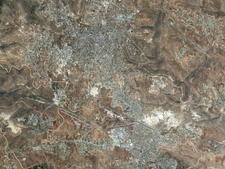
2010 satellite shot of Rifaf Khan Int'l Airport, with parallel runway of Atarot Airbase one mile to the west
Seven international airports are currently in operation in Palestine, all owned and operated by the Palestine Airports Authority under the State Secretariat of Transportation:
- Rifaf Khan International Airport (RFX), named after fourth President of Palestine Rifaf Khan and the only international airport in the West Bank, is located next to the city of Kafr Aqab between Ramallah and Jerusalem, and serves as the primary international gateway to the Palestinian capital and the rest of the West Bank;
- Port Said International Airport (PSD) is located at the northwestern outskirts of Port Said proper, built on reclaimed land along the Mediterranean coast;
- Sharm el-Sheikh International Airport (SSH) serves the namesake resort town on the southern Red Sea coast of the Sinai Peninsula;
- Arish International Airport (AAC), located south of the city of Arish on the western bank of the Pleides, serves as the main gateway to the northern Sinai region;
- Taba International Airport (TBX) serves Taba, a port city located at the northern end of the Gulf of Aqaba near the Israeli border;
- Yasser Arafat International Airport (ARF), named after sixth President of Palestine Yasser Arafat, serves the southern Gaza area and is located on the outskirts of the city of Rafah;
- Sheikh Zaid–Gaza International Airport (GZA), serving the northern Gaza area, located northeast of Gaza City in the municipality of Sheikh Zaid.
Sharm el-Sheikh International Airport is the only civilian airport in Palestine with more than one runway. Plans are currently underway for the development of a parallel runway at Rifaf Khan International Airport, and construction of a new international airport in Port Fuad with two runways to complement the over-capacity Port Said International Airport is expected to complete construction in spring 2020.
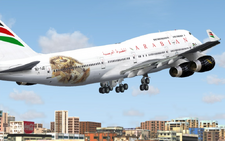
An Arabian Airlines Boeing 747-400 taking off from RFX in 2016
Palestine's de facto flag carrier is Arabian Airlines, owned by Arabian Airlines Group, itself a subsidiary of All-Arabian Holding Group, one of the largest publicly traded companies listed on the Palestine Stock Exchange. Arabian Airlines is the second-largest airline in the Arab world by fleet size as well as number of destinations served, and is considered a competitor of Emirates, the flag carrier of the UAE. It is based out of Rifaf Khan International Airport, and its main foreign hub is Queen Alia International Airport in Amman, Jordan.
Marine[]
The busiest port in Palestine for container ships as well as oil tankers is Port Said, the most populous city in Palestine which depends on the port for its economic wellbeing. Other major ports are located at Gaza City, Taba, and Tour. The State Secretariat of Transportation runs the Marine Transport Safety Directorate which implements and regulates policy on marine transport, including passenger services. The Palestinian Coast Guard is a civilian non-governmental organisation subsidised by the state which is responsible for enforcing maritime safety laws and responding to distress calls and performing other search-and-rescue functions. The Coast Guard also supports border security operations at sea by providing transportation for customs officials, and frequently assists the Palestinian Navy with logistical matters.
Sinocrot, a Palestinian publicly traded joint-stock company (a shariket el-mossahameh), operates a major portion of the container shipping and related maritime transportation and logistics industry in the country, and is actually one of the largest shipping companies in the world. It is based out of Port Said, and listed on the Palestine Stock Exchange. Palestine also has several shipbuilding companies, such as Jaffa Shipyard.
Civil rights[]
The constitution guarantees the people the right to choose their government: citizens elect their legislative representatives every 3 years, and there are presidential elections every 6 years. The constitution also establishes separation of powers. In practice, however, the executive branch and the president have a degree of legislative influence, such as the president's veto power. Additionally, many institutions are directly or indirectly subordinate to the ruling Ba'ath Party, headed by the President of Palestine in his capacity as Regional Secretary of the Palestinian Regional Branch. Many observers see Palestinian politics as being a dominant-party system: opposition parties are free to advertise and promote their policies and run in elections, but in practice are unable to match the wide reach of the ruling party and its allies in the National Progressive Front.
Private citizens have free access to the internet including social media, and domestic online publishers are not subject to state censorship. Nevertheless, negative portrayal of the nation and its leadership or direct criticism of government policies is considered taboo, and libel cases have been made against unpopular political sentiments and resulted in criminal charges for some individuals, especially during times of high regional tension. Similarly, public protests and demonstrations, while not banned outright, are required to obtain official permission, with overtly anti-government demonstrations routinely denied permits. During the 1980s, there were several instances during which Islamist protesters armed themselves in an attempt to resist police dispersal, rapidly escalating into street fighting and provoking the national government to deploy the military causing many thousands of deaths.
Due to the secular ideological nature of Ba'athist policy, the government grants full civil rights to all citizens regardless of religion, ethnicity and gender, and punishes criminally incitement toward discrimination against minority groups. In addition, extreme right-wing religious groups (mostly Islamist parties like the Muslim Brotherhood) are barred from participating in domestic politics. Neither the constitution nor any laws specifically mention homosexuality or sexual identity; however, there are recorded cases of the law against "discrimination of any kind toward minorities of any kind" being used to justify punishment of hateful and violent acts against gay people and other sexual minorities. Nevertheless, Palestine is still an Arab nation with a relatively conservative, Muslim-majority population: with the exception of Port Said, which has several gay bars and is considered a 'liberal haven', sexual minorities in the country generally have to maintain discretion around their intimate relationships.
Culture[]
The culture of the Palestinian people, located across Historic Palestine in the Republic of Palestine and State of Israel, as well as in the Palestinian diaspora, is influenced by the many diverse cultures and religions which have existed in the region from the early Canaanite period onward. Cultural contributions to the fields of art, literature, music, costume and cuisine express the Palestinian identity despite a history of geographical separation and territorial disputes in Historic Palestine.
Palestinian culture consists of food, dance, legends, oral history, proverbs, jokes, popular beliefs, customs, and comprising the traditions (including oral traditions) of Palestinian culture, with a strong Arab influence due to the Arabization of the region centuries ago. The folklorist revival among Palestinian intellectuals such as Nimr Sirhan, Musa Allush, Salim Mubayyid have emphasized pre-Islamic (and pre-Hebraic) cultural roots, re-constructing Palestinian identity with a focus on Canaanite and Jebusite cultures. Such efforts seem to have borne fruit as evidenced in the organization of celebrations like the Qabatiya Canaanite festival and the annual Music Festival of Yabus by the Ministry of Culture.
Dress, dance and folk music[]
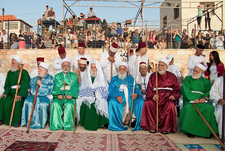
Foreign travelers to Palestine in late 19th and early 20th centuries often commented on the rich variety of costumes among the Palestinian people, and particularly among the fellaheen or village women. Until the 1940s, a woman's economic status, whether married or single, and the town or area they were from could be deciphered by most Palestinian women by the type of cloth, colours, cut, and embroidery motifs, or lack thereof, used for the robe-like dress or "thoub" in Arabic. Christians and Samaritans especially were known for their flamboyant and colourful traditional costumes sported by both genders.
The 1948 Palestinian exodus led to a disruption in traditional modes of dress and customs, as many women who had been displaced could no longer afford the time or money to invest in complex embroidered garments. New styles began to appear the 1960s. For example, the "six-branched dress" named after the six wide bands of embroidery running down from the waist. These styles came from the refugee camps, particularly after 1967. Individual village styles were lost and replaced by an identifiable "Palestinian" style. The shawal, a style popular in the West Bank and Jordan before the First Intifada, probably evolved from one of the many welfare embroidery projects in the refugee camps; it was a shorter and narrower fashion, with a western cut.
Dabke (Arabic: دبكة) is an Arab folk dance native to the Levant countries, including many traditional variants in Palestine. It is popular in Palestinian culture, and many troupes perform the dance throughout the world. The Dabke is marked by synchronized jumping, stamping, and movement, similar to tap dancing.
Traditional Palestinian songs have no set lyrics but rather a set rhythm to them, allowing for improvised folk poetry lyrics. A form of this style of folk singing is Ataaba; it consists of 4 verses, following a specific form and meter. The distinguishing feature of ataaba is that the first three verses end with the same word meaning three different things, and the fourth verse serves as a conclusion. The Ataaba continues to be performed at weddings and festivals in Arab localities in Israel, the West Bank and Gaza strip.
Other traditional Palestinian song styles include Zajal, Bein el-Dawai, el-Rozana, Zarif el-Toul, el-Maijana, Sahja/Saamir and Zaghareed.
Over three decades, the Palestinian National Music and Dance Troupe (El Funoun) and Mohsen Subhi have reinterpreted and rearranged traditional wedding songs such as Mish'al (1986), Marj Ibn Amer (1989) and Zaghareed (1997).
Sports[]
Palestinian athletes have competed at every Olympic Games since the 1996 Summer Olympics. There is a West Bank Premier Football League and Gaza Strip League. The Palestine National Football Team played Afghanistan in the 2014 FIFA World Cup qualifiers. They visited Australia for the 2015 AFC Asian Cup.
The Beit Jala Lions is a West Bank Rugby Union team.
The Turmus Aya Equestrian Club, established in 2007, is a riding club dedicated to the mission of providing affordable access to horses for Palestinians. Ashraf Rabi, the founder, maintains that "this is part of the development of Palestine. Horses are a big part of our Arab culture and we must embrace it."
Intellectuals[]
In the late 19th century and early 20th century, Palestinian intellectuals were integral parts of wider Arab intellectual circles, as represented by individuals such as May Ziade and Khalil Beidas. Educational levels among Palestinians have traditionally been high. In the 1960s, the West Bank had a higher percentage of its adolescent (15 to 17 years of age) population enrolled in high school than Israel; the West Bank had a 44.6% high school enrollment rate versus a 22.8% enrollment rate in Israel. Claude Cheysson, France’s Minister for Foreign Affairs under the first Mitterrand Presidency, held in the mid eighties that "even thirty years ago, [Palestinians] probably already had the largest educated elite of all the Arab peoples."
Diaspora figures like Edward Said and Ghada Karmi, Arab citizens of Israel like Emile Habibi, and Jordanians like Ibrahim Nasrallah have made contributions to a wide number of fields, exemplifying the diversity of experience and thought among Palestinians.
Architecture[]

Dome of the Rock mosaic art
Traditional Palestinian architecture covers a vast historical time frame and a number of different styles and influences over the ages. The urban architecture of Palestine prior to 1850 was relatively sophisticated. While it belonged to greater geographical and cultural context of the Levant and the Arab world, it constituted a distinct tradition, "significantly different from the traditions of Syria, Lebanon or Egypt." Nonetheless, the Palestinian townhouse shared in the same basic conceptions regarding the arrangement of living space and apartment types commonly seen throughout the Eastern Mediterranean. The rich diversity and underlying unity of the architectural culture of this wider region stretching from the Balkans to North Africa was a function of the exchange fostered by the caravans of the trade routes, and the extension of Ottoman rule over most of this area, beginning in the early 16th century through until the end of World War I.
Literature[]
The long history of the Arabic language and its rich written and oral tradition form part of the Palestinian literary tradition as it has developed over the course of the 20th and 21st centuries. Since 1948, most critics have theorized the existence of three "branches" of Palestinian literature, loosely divided by geographic location: 1) from inside the Palestinian republic, 2) from Israel, 3) from among the Palestinian diaspora throughout the Middle East.
Traditional storytelling among Palestinians is prefaced with an invitation to the listeners to give blessings to God and the Prophet Mohammed or the Virgin Mary as the case may be, and includes the traditional opening: "There was, in the oldness of time ..." Formulaic elements of the stories share much in common with the wider Arab world, though the rhyming scheme is distinct. There are a cast of supernatural characters: jinn who can cross the Seven Seas in an instant, giants, and ghouls with eyes of ember and teeth of brass.
Palestinian Literature spoke to other causes of oppression and discrimination across the world. In his book, one of the foremost leaders of Palestinian literature and the person who coined the term Palestinian Resistance Literature, Ghassan Kanafani says, "In my stories I give my characters the freedom to express their own positions without reservation" This sense of international solidarity can also be found in Palestinian poets' work such as in Mahmoud Darwish's poem Cuban Chants, "And the banner in Cuba.. The rebel raises it in the Aures.. Oh a nation that feels cold," and in Samih Al-Qasim's poem, Birds Without Wings.
In the period between the 1948 Palestinian exodus and the 1967 Six-Day War, Palestinian Resistance Literature played a significant role in maintaining the Palestinian identity; forming a bridge between the two periods, which allowed the Palestinian identity to survive especially in the absence of armed resistance. In his book, Palestinian Resistance Literature Under Occupation, Ghassan Kanafani argues, "Palestinian resistance literature, just like armed resistance, shapes a new circle in the historical series which practically has not been cut throughout the last half century in the Palestinian life."
Poetry[]
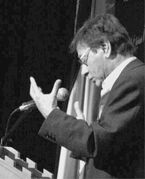
National poet Mahmoud Darwish
Poetry, using classical pre-Islamic forms, remains an extremely popular art form, often attracting Palestinian audiences in the thousands. Until 20 years ago, local folk bards reciting traditional verses were a feature of every Palestinian town. After the 1948 Palestinian exodus, poetry was transformed into a vehicle for political activism. From among those Palestinians who became Arab citizens of Israel after the passage of the Citizenship Law in 1952, a school of resistance poetry was born that included poets like Mahmoud Darwish, Samih al-Qasim, and Tawfiq Zayyad. The work of these poets was largely unknown to the wider Arab world for years because of the lack of diplomatic relations between Israel and Arab governments. This changed after Ghassan Kanafani, another Palestinian writer in exile in Lebanon, published an anthology of their work in 1966. Palestinian poets often write about a sense of loss and existence in the diaspora.
Cuisine[]
Palestine's history of rule by many different empires is reflected in Palestinian cuisine, which has benefited from various cultural contributions and exchanges. Generally speaking, modern Palestinian dishes have been influenced by the rule of three major Islamic groups: the Arabs, the Persian-influenced Arabs, and the Turks. The original Bedouin Arabs in Syria and Palestine had simple culinary traditions primarily based on the use of rice, lamb and yogurt, as well as dates.
Palestinian cuisine consists of foods from or commonly eaten by Palestinians—which includes those living in Palestine, Jordan, refugee camps in nearby countries as well as by the Palestinian diaspora. The cuisine is a diffusion of the cultures of civilizations that settled in the region of Palestine, particularly during and after the Islamic era beginning with the Arab Ummayad conquest, then the eventual Persian-influenced Abbasids and ending with the strong influences of Turkish cuisine, resulting from the coming of the Ottoman Turks. It is similar to other Levantine cuisines, including Lebanese, Syrian and Jordanian.
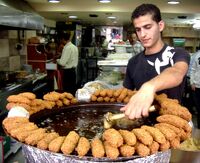
Serving falafel in Ramallah
Cooking styles vary by region and each type of cooking style and the ingredients used are generally based on the climate and location of the particular region and on traditions. Rice and variations of kibbee are common in the Galilee. The West Bank engages primarily in heavier meals involving the use of taboon bread, rice and meat and coastal plain inhabitants frequent fish, other seafood, and lentils. The Gaza cuisine is a variation of the Levant cuisine, but is more diverse in seafood and spices. Gaza's inhabitants heavily consume chili peppers too. Meals are usually eaten in the household but dining out has become prominent particularly during parties where light meals like salads, bread dips and skewered meats are served.
The area is also home to many desserts, ranging from those made regularly and those that are commonly reserved for the holidays. Most Palestinian sweets are pastries filled with either sweetened cheeses, dates or various nuts such as almonds, walnuts or pistachios. Beverages could also depend on holidays such as during Ramadan, where carob, tamarind and apricot juices are consumed at sunset. Coffee is consumed throughout the day and liquor is not very prevalent among the population, however, some alcoholic beverages such as arak or beer are consumed by Christians and less conservative Muslims.
Demographics[]
The majority of the population identify as Palestinian Arabs, who speak a dialect of Levantine Arabic most closely related to that of Lebanon and southern Syria. Since 2003, Palestine has accepted almost one million refugees from Iraq and since 2011, another million from Syria, who have brought with them their own dialects which have influenced the popular speech. There is also a small community of Bedouins native to the Sinai Desert, who speak a dialect closer to Peninsular Arabic. Most other ethnic communities speak Arabic as their mother tongue, with the exception of Jews and Turks, who generally understand Arabic but speak Hebrew and Turkish, respectively, at home. The industrial and urban areas of the country are home to many migrant workers from countries such as Pakistan, India, Indonesia and the Philippines. There is also a significant Chinese community in Port Said.
The Arab community, which represents 95% of the population, has a ratio of roughly 50:40:10 of Sunnis, Shiites and Greek Orthodox Christians. There are also a small amount of Coptic Christians, who speak Arabic but usually do not identify as Arabs, as well as several Armenian families multiple generations old who are also Christian; several Armenian Apostolic Church congregations exist, notably in the Armenian Quarter of the Old City of Jerusalem. In addition, there are small communities of Jews, Druze and Samaritans, each of whom have their own unique religion, and Turks, who are almost entirely Sunni Muslims.
Population history[]
| Year | Population | % change per annum |
|---|---|---|
| 1950 | 788,000 | |
| 1955 | 906,352 | 3% |
| 1960 | 1,338,460 | 9.53% |
| 1965 | 1,705,248 | 5.48% |
| 1967 | 1,889,400 | 5.4% |
| 1979 | 2,204,000 | 1.39% |
| 1980 | 2,659,180 | 20.65% |
| 1985 | 3,108,612 | 3.38% |
| 1990 | 3,877,315 | 4.95% |
| 1996 | 3,012,354 | –3.7% |
| 2000 | 4,109,238 | 9.1% |
| 2004 | 5,393,290 | 7.8% |
| 2010 | 6,617,408 | |
| 2012 | 8,336,395 | |
| 2014 | 9,192,829 | |
| 2016 | 9,859,417 | |
| 2017 | 10,517,390 | |
| 2018 | 11,056,331 |
Source: Palestine Municipal Census